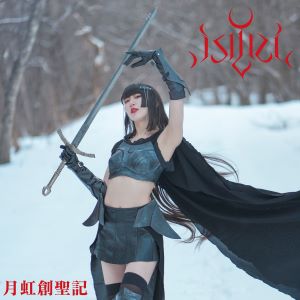Himari Tsukishiro is a name that most following the Japanese alt-idol scene would be familiar with due to her involvement early on with Bakuon Dolls Syndrome, as well as Necronomidol. The latter being one of the most unique idol-based acts to stem from the country with their imaginative mashing of jpop, black metal, darkwave, and folk (amongst others). With Necronomidol going into indefinite hiatus last year, Isiliel is Tsukishiro’s solo outlet (which did start before said hiatus), and Moonbow Genesis is her first full-length release after releasing a few singles last year. Those expecting something more pop-driven may be surprised to hear her evolution with this album. This feels like a step further away from that, embracing even more of a post-black and folky sound that may not have all the eccentricity of her previous outlet, but nonetheless showcases an even more potent and ethereal journey that’s sure to captive many who many have escaped her grasp until now.
Moonbow Genesis seems to seamlessly weave back and forth between driving, triumphant black metal glory, thundering grooves, and more somber, introspective moments. It’s an odd combination at first, but it quickly grows on you as the album progresses. One of the highlights, “Keisei Densetsu” has a monstrous, almost melodic death metal backbone to the riffing that yearns to soar upwards. But then the song swerves into more synth-driven grooves, buzzing blastbeats and blackgaze, and moments of uplifting atmospheric beauty – all in the span of 4-minutes. The closing “Genesis” ends on some of the most electronically-laced and upbeat riffing the album has to offer, but at the same time, Tsukishiro’s vocals have an almost choral quality to them that makes it all feel more folk-driven. It’s a really intriguing contrast to hear, one that feels both peaceful yet triumphant at the same time. On the more post-side of things, the folk-driven “Kikoku Enbu” is the longest, and one of the prettiest sounding songs of the bunch. Flutes and more traditional instrumentation make the song a vivid one at the start, and the soothing vocals (even as the music escalates) are the icing on the cake, as the latter half of the song embraces some very melodic guitar moments to make for a poignant and strong finish.
One might be surprised to know that Moonbow Genesis was recorded at the legendary Studio Fredman, but the results speak for themselves. There’s a real weight to the guitarwork (and drums), and songs like “Seian Kengen” really benefit from the meshing of that European crunch with clear Japanese influences worn on Isiliel’s sleeves. As for the obvious highlight of Tsukishiro’s vocals, getting her into the full spotlight from being one of several idols seems a logical step based on her work here. Her vocals carry a certain warmth that effectively juxtaposes the occasionally colder, blackened sound, and when the music calls for something more triumphant, boy does she shine. “Koumyou Kishi” impresses as the opener with her gorgeous singing opposing the sorrow-filled guitar melodies, offering that sliver of hope with somber sincerity. With a cut like “Jodo Dokushou” though, her voice acts as the call to arms over the rousing riff section, inevitably leading to at least a raise of fists in the live scene.
An impressive step up for Himari Tsukishiro, who proves herself not just as a solo artist, but as a certified powerhouse who should be able to grasp a solid foothold internationally if she can generate the right buzz. Moonbow Genesis should provide appeal to not just fans of Japanese metal acts, but anyone interested in atmospheric blackgaze or even folk metal without much effort. Much like some of the best acts coming out of Japan, Isiliel has a unique sound that deserves a much wider audience. There’s a ton of potential to tap into here, even with the promise already being displayed.


